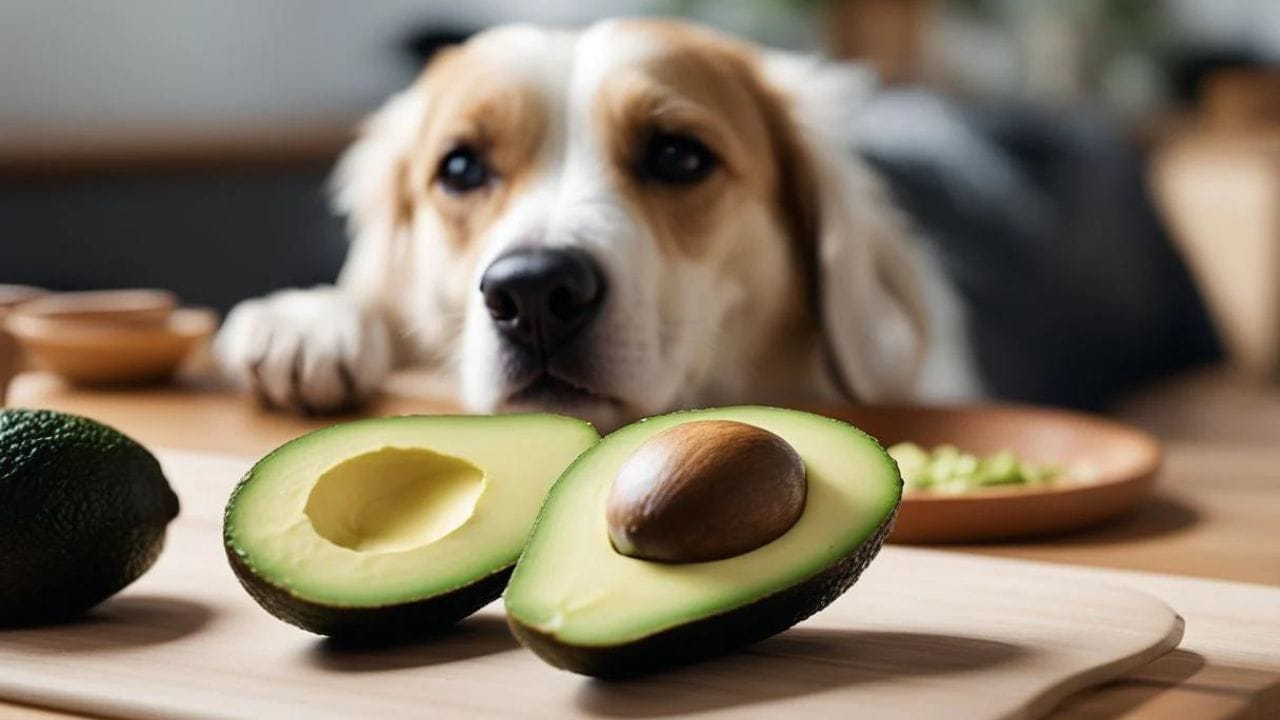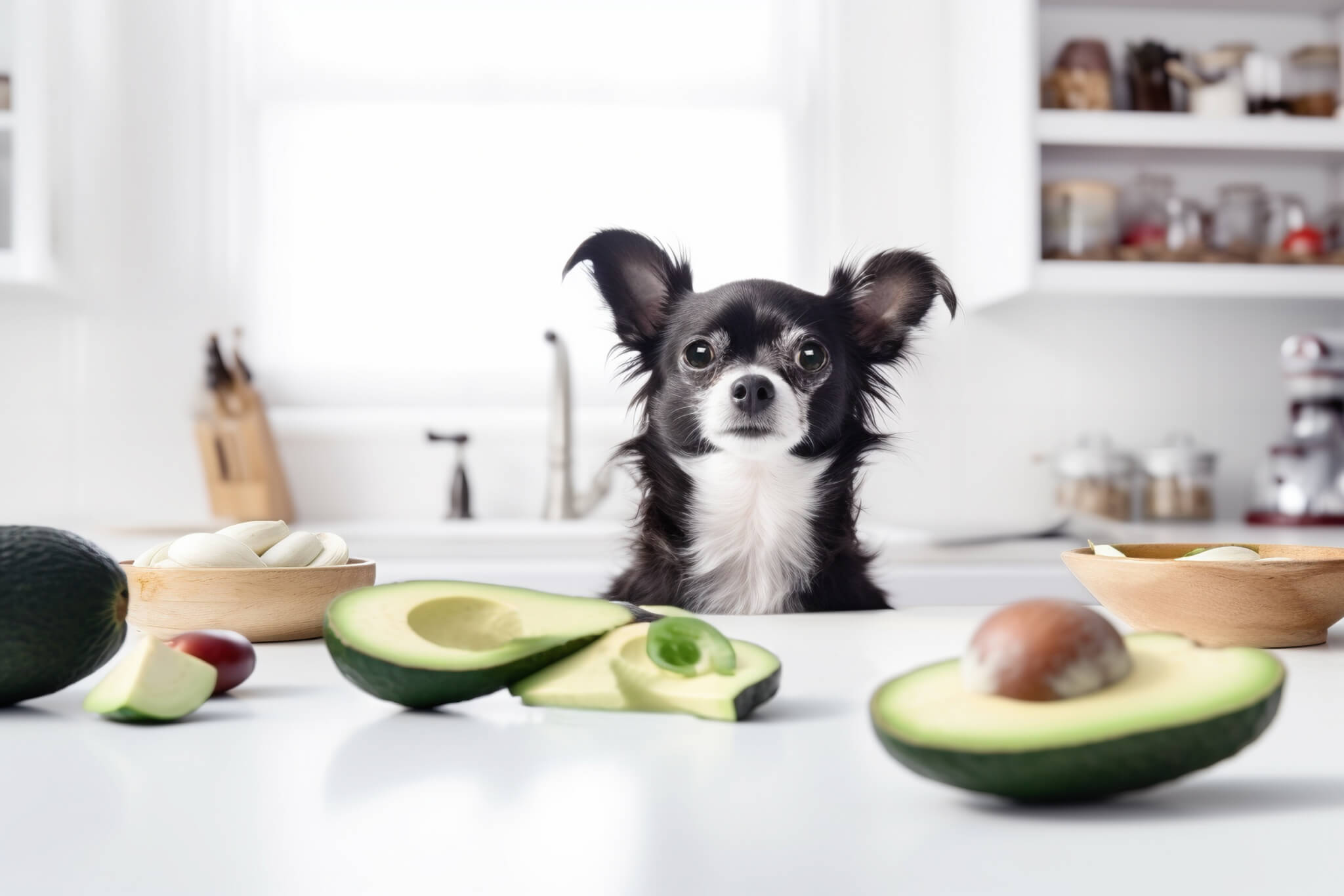Avocado is a popular fruit known for its creamy texture and numerous health benefits. It is rich in healthy fats, fiber, and vitamins, making it a favorite among health-conscious individuals. However, when it comes to dogs, the question arises: are avocados good for them?

The answer is not straightforward. While avocados contain many nutrients that are beneficial to dogs, they also contain a toxin called persin that can be harmful to them in large quantities. Persin is found in the leaves, bark, and seeds of the avocado plant, but it is most concentrated in the fruit's skin and pit. Ingestion of large amounts of persin can cause vomiting, diarrhea, and even death in dogs.
So, can dogs eat avocados? The answer is yes, but with caution. It is safe for dogs to eat the flesh of ripe avocados in small amounts, as it contains only trace amounts of persin. However, it is important to keep the skin and pit away from them as they contain higher concentrations of the toxin. In addition, dogs with sensitive stomachs or those prone to pancreatitis should avoid avocados altogether due to their high-fat content.
Nutritional Benefits of Avocados for Dogs
Avocados are a good source of nutrition for dogs, containing healthy fats, vitamins, minerals, and fiber. Here are some of the key nutritional benefits of avocados for dogs:
Healthy Fats and Oils
Avocados are rich in healthy fats and oils that can provide dogs with energy and help maintain healthy skin and coat. The monounsaturated and polyunsaturated fats in avocados can also help reduce inflammation and improve heart health.

Vitamins and Minerals
Avocados contain a variety of vitamins and minerals that can benefit dogs. For example, they are a good source of vitamin E, which can help support healthy skin and coat, and vitamin K, which can aid in blood clotting. Avocados also contain potassium, which can help regulate blood pressure, and folate, which is important for cell growth and development.
Fiber Content
Avocados are high in fiber, which can help promote healthy digestion and bowel movements in dogs. Fiber can also help regulate blood sugar levels and reduce the risk of obesity and other health problems.
However, it is important to note that avocados also contain a toxin called persin, which can be harmful to dogs in large quantities. Therefore, it is recommended to feed avocados to dogs in moderation and avoid feeding them the skin, pit, or leaves of the fruit. If you notice any adverse reactions in your dog after feeding them avocado, such as vomiting or diarrhea, consult with your veterinarian.
Potential Risks of Feeding Avocados to Dogs
Avocados are a delicious and nutritious fruit for humans, but pet owners must be cautious when feeding them to their furry friends. While avocados contain many beneficial nutrients, they also pose some potential risks to dogs. In this section, we will discuss three of the most significant risks associated with feeding avocados to dogs.
Persin Toxicity
Persin is a natural fungicidal toxin found in avocados. While it is generally safe for humans to consume, it can be toxic to dogs in large amounts. Symptoms of persin toxicity in dogs can include vomiting, diarrhea, and difficulty breathing. In severe cases, persin toxicity can lead to death.

It is important to note that not all dogs will react to persin in the same way. Some dogs may be more sensitive to the toxin than others, and some may not experience any symptoms at all. However, it is generally recommended that pet owners avoid feeding avocados to their dogs to prevent the risk of persin toxicity.
Choking Hazards
Another potential risk associated with feeding avocados to dogs is choking. Avocado pits are large and hard, and they can pose a choking hazard to dogs if swallowed whole. If a dog does manage to swallow an avocado pit, it can also cause a blockage in their intestinal tract, which can be life-threatening.
Pancreatitis Risk
Finally, feeding avocados to dogs can also increase their risk of developing pancreatitis. This is because avocados are high in fat, and a diet that is too high in fat can lead to inflammation of the pancreas. Pancreatitis can cause a range of symptoms in dogs, including vomiting, diarrhea, and abdominal pain.
In conclusion, while avocados do offer some potential health benefits for dogs, they also pose some significant risks. Pet owners should be cautious when feeding avocados to their dogs and should always consult with their veterinarian before introducing any new foods into their pet's diet.
Safe Feeding Practices
Proper Portion Sizes
When it comes to feeding avocados to dogs, it is important to keep portion sizes in mind. While avocados can be a healthy addition to a dog's diet, they should not make up a significant portion of their meals. A good rule of thumb is to feed avocados in moderation, as an occasional treat or addition to their regular meals.
Preparation Techniques
Before feeding avocados to dogs, it is important to properly prepare them. The flesh of a ripe avocado is safe for dogs to eat, but the skin, pit, and leaves contain a toxin called persin that can be harmful to dogs. Therefore, it is important to remove the skin and pit before feeding avocado to dogs. Additionally, it is recommended to mash or puree the avocado before feeding it to dogs to make it easier for them to digest.
Frequency of Feeding
While avocados can be a healthy addition to a dog's diet, they should not be fed too frequently. It is recommended to feed avocados to dogs in moderation, as an occasional treat or addition to their regular meals. Overfeeding avocados to dogs can lead to digestive issues, such as vomiting and diarrhea.
In summary, avocados can be a healthy addition to a dog's diet when fed in moderation and properly prepared. However, it is important to keep portion sizes in mind, remove the skin and pit, and feed avocados in moderation to avoid any potential health issues.
Alternatives to Avocados
While avocados are a popular and healthy food for humans, they can be toxic to dogs due to a substance called persin. Owners looking to provide their pets with a nutritious and safe diet should consider other options.

Safe Fruits for Dogs
There are several fruits that are safe for dogs to eat in moderation, including:
- Apples: Apples are a great source of fiber, vitamin A, and vitamin C. However, be sure to remove the seeds and core as they can be a choking hazard.
- Bananas: Bananas are high in potassium, vitamin B6, and vitamin C. They are also a great source of fiber. However, they are also high in sugar, so should be given in moderation.
- Blueberries: Blueberries are low in calories and high in fiber, vitamin C, and antioxidants. They are a great treat for dogs, but should be given in moderation.
Vegetable Snacks
Vegetables are also a great option for dogs. Some safe and healthy vegetable snacks include:
- Carrots: Carrots are a great source of vitamin A, fiber, and potassium. They are also low in calories, making them a great snack for dogs.
- Green beans: Green beans are a great source of fiber, vitamin K, and vitamin C. They are also low in calories and can be a great snack for dogs.
- Sweet potatoes: Sweet potatoes are high in fiber, vitamin A, and potassium. They are also a great source of antioxidants. However, they should be cooked before feeding to dogs.
Commercial Dog Treats
There are also many commercial dog treats that are safe and healthy for dogs. Look for treats that are made with natural ingredients and are free from preservatives and artificial colors. Some popular options include:
- Zuke's Mini Naturals: These treats are made with high-quality protein and are free from wheat, corn, and soy. They are also low in calories, making them a great option for dogs.
- Blue Buffalo Wilderness Trail Treats: These treats are made with real meat and are free from chicken or poultry by-product meals. They are also free from artificial preservatives, colors, and flavors.
- Wellness Soft Puppy Bites: These treats are made with high-quality protein and are free from wheat, corn, and soy. They are also free from artificial colors and flavors.
Consulting Your Veterinarian
Before adding any new food to your dog's diet, it is always important to consult with your veterinarian. They can help determine if avocados are a safe and appropriate addition to your dog's meals.
During the consultation, the veterinarian may consider various factors such as the dog's age, weight, breed, and overall health condition. They can also advise on the appropriate amount of avocado to feed the dog and how often it should be given.
It is important to note that while some dogs may be able to tolerate small amounts of avocado, others may experience adverse reactions. Some dogs may be allergic to avocado, while others may develop digestive problems such as vomiting and diarrhea.
In addition, it is important to avoid feeding your dog avocado leaves, skin, and pit as they contain persin, a toxin that can be harmful to dogs.
Overall, while avocados can provide some nutritional benefits to dogs, it is important to consult with a veterinarian before adding this fruit to your dog's diet. They can help determine if avocados are safe and appropriate for your dog and recommend the appropriate amount to feed them.
Conclusion
In conclusion, avocados can offer some nutritional benefits to dogs, such as healthy fats, vitamins, and minerals. However, they also pose significant risks due to the toxin persin, especially in the skin, pit, and leaves. Pet owners should practice caution when incorporating avocados into their dog's diet, ensuring they serve only the flesh in moderate amounts and avoid overfeeding. Furthermore, some dogs may be more sensitive to avocados than others, risking symptoms like vomiting, diarrhea, or pancreatitis.
To provide your dog with safe, nutritious snacks, consider alternative fruits and vegetables or opt for high-quality commercial treats. As always, it's crucial to consult with your veterinarian before introducing any new food into your pet's diet. They can provide personalized advice based on your dog's health, breed, and dietary needs, ensuring that any new addition, including avocados, is suitable and safe for your furry companion.




